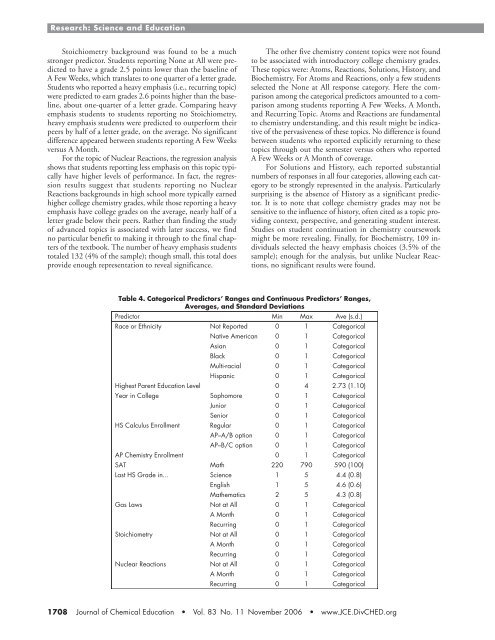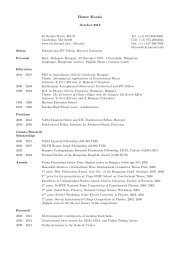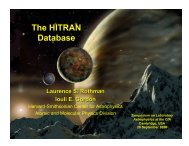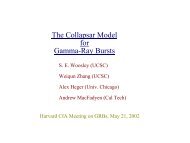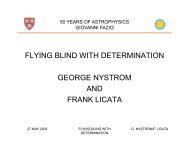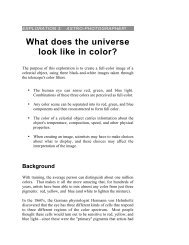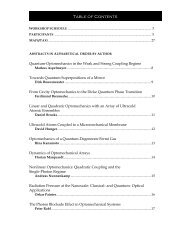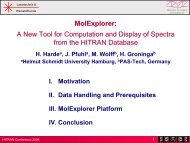High School Chemistry Content Background of Introductory College ...
High School Chemistry Content Background of Introductory College ...
High School Chemistry Content Background of Introductory College ...
Create successful ePaper yourself
Turn your PDF publications into a flip-book with our unique Google optimized e-Paper software.
Research: Science and Education<br />
Stoichiometry background was found to be a much<br />
stronger predictor. Students reporting None at All were predicted<br />
to have a grade 2.5 points lower than the baseline <strong>of</strong><br />
A Few Weeks, which translates to one quarter <strong>of</strong> a letter grade.<br />
Students who reported a heavy emphasis (i.e., recurring topic)<br />
were predicted to earn grades 2.6 points higher than the baseline,<br />
about one-quarter <strong>of</strong> a letter grade. Comparing heavy<br />
emphasis students to students reporting no Stoichiometry,<br />
heavy emphasis students were predicted to outperform their<br />
peers by half <strong>of</strong> a letter grade, on the average. No significant<br />
difference appeared between students reporting A Few Weeks<br />
versus A Month.<br />
For the topic <strong>of</strong> Nuclear Reactions, the regression analysis<br />
shows that students reporting less emphasis on this topic typically<br />
have higher levels <strong>of</strong> performance. In fact, the regression<br />
results suggest that students reporting no Nuclear<br />
Reactions backgrounds in high school more typically earned<br />
higher college chemistry grades, while those reporting a heavy<br />
emphasis have college grades on the average, nearly half <strong>of</strong> a<br />
letter grade below their peers. Rather than finding the study<br />
<strong>of</strong> advanced topics is associated with later success, we find<br />
no particular benefit to making it through to the final chapters<br />
<strong>of</strong> the textbook. The number <strong>of</strong> heavy emphasis students<br />
totaled 132 (4% <strong>of</strong> the sample); though small, this total does<br />
provide enough representation to reveal significance.<br />
The other five chemistry content topics were not found<br />
to be associated with introductory college chemistry grades.<br />
These topics were: Atoms, Reactions, Solutions, History, and<br />
Biochemistry. For Atoms and Reactions, only a few students<br />
selected the None at All response category. Here the comparison<br />
among the categorical predictors amounted to a comparison<br />
among students reporting A Few Weeks, A Month,<br />
and Recurring Topic. Atoms and Reactions are fundamental<br />
to chemistry understanding, and this result might be indicative<br />
<strong>of</strong> the pervasiveness <strong>of</strong> these topics. No difference is found<br />
between students who reported explicitly returning to these<br />
topics through out the semester versus others who reported<br />
A Few Weeks or A Month <strong>of</strong> coverage.<br />
For Solutions and History, each reported substantial<br />
numbers <strong>of</strong> responses in all four categories, allowing each category<br />
to be strongly represented in the analysis. Particularly<br />
surprising is the absence <strong>of</strong> History as a significant predictor.<br />
It is to note that college chemistry grades may not be<br />
sensitive to the influence <strong>of</strong> history, <strong>of</strong>ten cited as a topic providing<br />
context, perspective, and generating student interest.<br />
Studies on student continuation in chemistry coursework<br />
might be more revealing. Finally, for Biochemistry, 109 individuals<br />
selected the heavy emphasis choices (3.5% <strong>of</strong> the<br />
sample); enough for the analysis, but unlike Nuclear Reactions,<br />
no significant results were found.<br />
Table 4. Categorical Predictors’ Ranges and Continuous Predictors’ Ranges,<br />
Averages, and Standard Deviations<br />
Predictor<br />
Race<br />
or Ethnicity<br />
Min<br />
M ax<br />
Ave (s.d.)<br />
Not<br />
Reported<br />
0 1 Categorical<br />
Native<br />
American 0 1 Categorical<br />
Asian<br />
0 1 Categorical<br />
Black<br />
0 1 Categorical<br />
Multi-racial<br />
0 1 Categorical<br />
Hispanic<br />
0 1 Categorical<br />
<strong>High</strong>est<br />
Parent Education Level<br />
0 4 2.73 (1.10)<br />
Year<br />
in <strong>College</strong><br />
HS<br />
Calculus Enrollment<br />
Sophomore<br />
0 1 Categorical<br />
Junior<br />
0 1 Categorical<br />
Senior<br />
0 1 Categorical<br />
Regular<br />
0 1 Categorical<br />
AP–A/B<br />
option 0 1 Categorical<br />
AP–B/C option 0 1 Categorical<br />
AP<br />
<strong>Chemistry</strong> Enrollment<br />
0 1 Categorical<br />
SAT<br />
Last<br />
HS Grade in...<br />
Gas<br />
Laws<br />
Stoichiometry<br />
Nuclear<br />
Reactions<br />
Math<br />
220<br />
790<br />
590 (100)<br />
Science<br />
1 5 4.4 (0.8)<br />
English<br />
1 5 4.6 (0.6)<br />
Mathematics<br />
2 5 4.3 (0.8)<br />
Not<br />
at All<br />
0 1 Categorical<br />
A Month<br />
0 1 Categorical<br />
Recurring<br />
0 1 Categorical<br />
Not<br />
at All<br />
0 1 Categorical<br />
A Month<br />
0 1 Categorical<br />
Recurring<br />
0 1 Categorical<br />
Not<br />
at All<br />
0 1 Categorical<br />
A Month<br />
0 1 Categorical<br />
Recurring<br />
0 1 Categorical<br />
1708 Journal <strong>of</strong> Chemical Education • Vol. 83 No. 11 November 2006 • www.JCE.DivCHED.org


